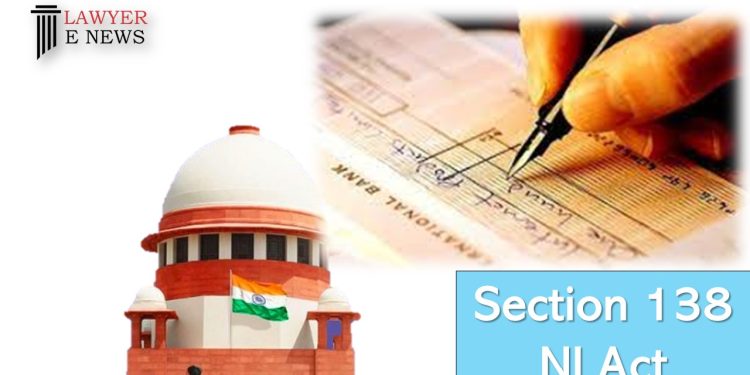Section 138 NI Act-If cheque signature is accepted, presumption is raised U/S 139 N.I. Act – Supreme Court

According to the Supreme Court, if the signature on the check is acknowledged, there will be a presumption under Section 139 of the Negotiable Instruments Act that the check was written to pay off an obligation that is lawfully enforceable. It is the responsibility of the accused to refute any such assumption that is made.
A court made up of Chief Justice of India NV Ramana, Justices Surya Kant and AS Bopanna stated, “..it is apparent that signature on the cheque having been admitted, a presumption shall be raised under Section 139 that the cheque was issued in discharge of debt or responsibility.”
The Karnataka High Court’s ruling to overturn the Magistrate’s conviction for the offence under Section 138 of the Negotiable Instruments Act was being appealed in the case Thriyambak S. Hegde v. Sripad, which the court was reviewing.
The bench cited the 2019 case Basalingappa v. Mudibasappa, in which the principles governing Sections 118(a) and 139 of the NI Act were succinctly stated as follows:
Section 139 of the Act requires a presumption that the check was written to settle any debt or other responsibility once the execution of the check has been admitted.
The burden of proving the likely defence is on the accused because the presumption under Section 139 is rebuttable. Preponderance of the evidence is the required level of proof to refute the assumption.
The accused is free to depend on his own evidence to disprove the presumption, or he can also rely on materials provided by the complainant to support a plausible defence. Preponderance of evidence might be inferred not only from the items that the parties have submitted to the record but also from their supporting evidence.
The burden of proof under Section 139 was an evidential one, not a persuasional one, therefore the accused need not testify in court to support his defence.
The accused does not have to enter the witness stand in order to support his defence.
The Court overturned the High Court’s acquittal and reinstated the conviction by applying the rules to the case’s facts.
Facts:
In this instance, the appellant claims that the respondent, who he has known for a number of years, approached him and informed him that he planned to sell the residence in Sirsi town due to financial difficulties. For the negotiated total sale cost of Rs. 4 lakh, the appellant consented to buy the property.
The respondent signed an agreement dated June 6, 1996, while also collecting an advance payment of Rs. 3,50,00,000, but the appellant afterwards discovered that the house actually belonged to the respondent’s father and that the latter did not have the right to sell it.
The respondent issued a check for a partial amount of Rs. 1,50,000 in response to the appellant’s demand for the return of Rs. 3,50,000 that he had paid as an advance. The appellant provided a check for realisation, but it was returned as having “insufficient funds” on the endorsement.
Following this, the appellant obtained the issuance of a notice advising the respondent that the check was invalid and requesting payment of the check amount, to which the respondent did not respond.
The respondent was therefore to be prosecuted by the appellant under Section 138 of the Negotiable Instruments Act of 1881 through a complaint made on July 14, 1998, in accordance with Section 200 of the Criminal Procedure Code.






